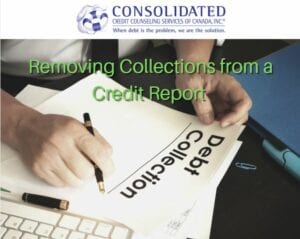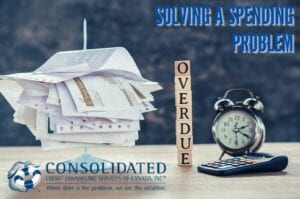A debt collector is someone collecting debts. When the company you owe money to carries your unpaid debts, they bring in collection agencies. A debt collector at the agency will become responsible for collecting your debt. For example, these professionals attempt to contact people who owe money. Then, they try to get them to pay what they owe. The original company will normally try to collect the money themselves first. But sometimes they can’t contact the debtor or they don’t respond to their letters and invoices. In this case, the lender would hire debt collection agencies to get payments for them. They can also sell your debt to buyer collection agencies. This normally happens for old debts. In addition, Canadians have rights that collectors must abide by. Learn more below.
What happens when your debt is sent to a collection agency?
A creditor sends your debt to a collection agency after they have tried to contact you. When they can’t reach you or you won’t work with them to pay your debts, they send a notice in writing. This notice will tell you they are sending your account to a collection agency. This written notice will give you important details, including:
- The exact debt collection agency who will be working your account
- The name of the creditor you owe money to
- The amount you owe
Are you tired of getting collection calls? We can help you get your debt payments in order.
Steps to take when you receive a notice that your debt is transferred to a collection agency
If you have received this notice, it’s not too late to act. Your creditor has not transferred your account to a collection agency yet. They are telling you they are about to. You will want to get a hold of your creditor as quickly as possible. You may be able to get them to keep your account in-house. This will help protect your credit score. Lastly, to keep your account from going to a collection agency, you may:
- Pay a portion or full amount of what you owe
- Make payment arrangements directly with the creditor
What happens to your credit score?
Once an account goes into collections, credit scores go down. A loan or credit card account in collections on your credit report does not look good. When lenders see this and the low score it produces, things will be harder for you:
- It will be harder to get new credit
- You will only get higher interest rates
- Insurance companies will charge more for insurance
- Finding an apartment to rent may be difficult
- Some employers may not hire you
What do you do when a debt collector calls?
You missed your chance to work with your creditor directly. Your account and debt have moved onto a collection agency. After the initial notice, you will begin to receive calls from debt collectors. Do not send payments without confirming some details. Work towards removing collections from your credit report.
Making sure that a collection agency is legitimate
Before you give excessive details about yourself or send payments. You will want to make sure the person you are talking to is legitimate. You need to ask and write down the following:
- The agent’s name
- The name of the collection agency
- Who the agent is collecting the money for
- The agents phone number
- The total amount owed
- Who you owe the debt to
- When the debt is first from
You need to confirm the information. Let the debt collector know you will call them back. Now you must make sure the debt is yours. Go through your bills and bank statements. Lastly, make sure you owe money to that company and the amount you owe is correct. Some debts may be old but still require payment.
How to spot debt collector scams
Collectors who legally have the right to collect your debt must prove it. The above details are the minimum of what they should be able to provide. Without a letter from your original creditor and invoices, they may be a scam. Furthermore, collectors should always give you details of their company and your original debt. If you ask them to confirm the debt, they will likely be able to work with you.
What should you do if the debt isn’t yours?
If you can’t confirm a debt or believe there’s an error, let the debt collector know. Call the original creditor and find out how to correct the error with them. This may be the same birthday or same name issue. Check your credit report to see if the debt or credit appears on your report.
Paying your debt once it has been transferred to a collection agency
If the debt is yours, you will need to pay it. Paying the full amount will be best for your credit score. This is not always an option for everyone. You can talk to the debt collector and explain your financial situation. Offer a payment plan that works for you. Many debt collectors help arrange monthly payments. Get the terms of repayment followed up in writing. Make the first payment as quickly as possible to show you intend to repay the debt.
Make sure you never send a collection agent cash. Always get a receipt for any payments you make. Only communicate with the agent who first contacted and made payment arrangements with you. This reduces confusion. You will also want to only talk to this agent and not your original creditor.
Your rights when dealing with a debt collector
Collection agencies cannot do whatever they want. They cannot harass you, call you excessively, or call you outside normal hours. They must respect your rights. There are Canadian federal laws. The U.S. has the Fair Debt Collection Practices Act (FDCPA) as well.
Who can a debt collector contact?
Debt collectors can only contact your friends, employers, relatives, or neighbours. Only to get your phone number or address, or a confirmation of employment from your employer. They cannot ask them other questions or provide them with your details. If you had a co-signer on your debt, collectors may speak to them in more detail. You can also authorize a third party to speak to your original creditor or its agents.
When can a debt collector contact you?
Debt collectors can only contact you at certain times and never on holidays:
- Monday – Saturday: 7:00 am – 9:00 pm
- Sundays: 1:00 pm – 5:00 pm
What aren’t debt collectors allowed to do?
- First, debt collectors are not allowed to attempt to collect your debts from others. Only co-signers can pay for your debts.
- They aren’t allowed to call excessively, as this is usually harassment.
- Collectors can’t threaten, intimidate, or use abusive language.
- They aren’t allowed to excessively pressure any debtor to pay.
- Debt collectors cannot lie or provide misleading information.
- They can’t call your cell phone unless you’ve given the number for that purpose.
- Lastly, they can’t add collection fees.
Making a complaint about a collection agency
If a debt collector has disrespected your rights, contact one of these regulators:
What to do now
If you have multiple types of debt and are struggling to make payments, you are still owed dignity. Debt collectors can be stressful to deal with. Also, they must treat you properly and follow rules and regulations for their job. If you feel overwhelmed with calls and debt, connect with Consolidated Credit Counselling Services of Canada. To emphasize, we have trained professionals to help you navigate debt and collectors.




